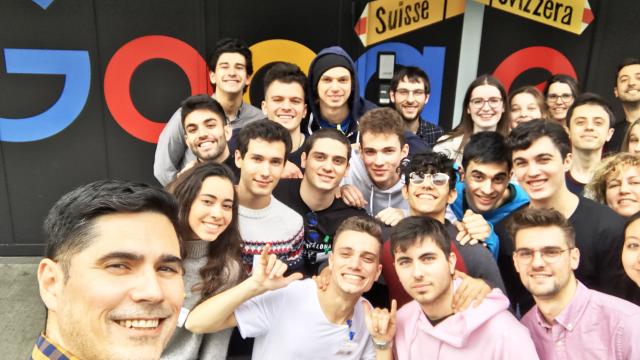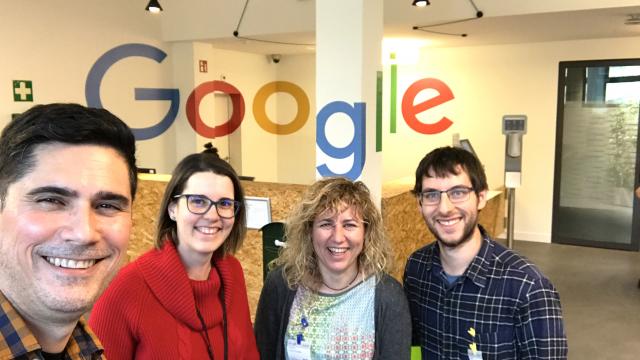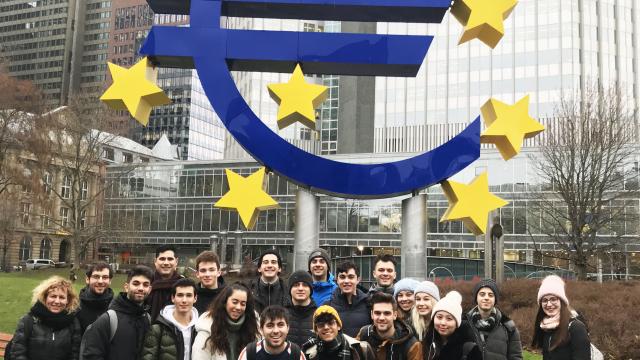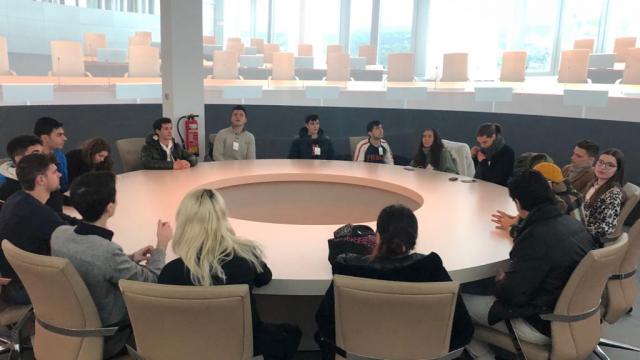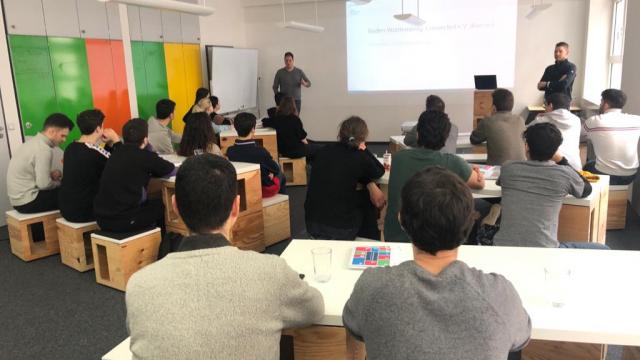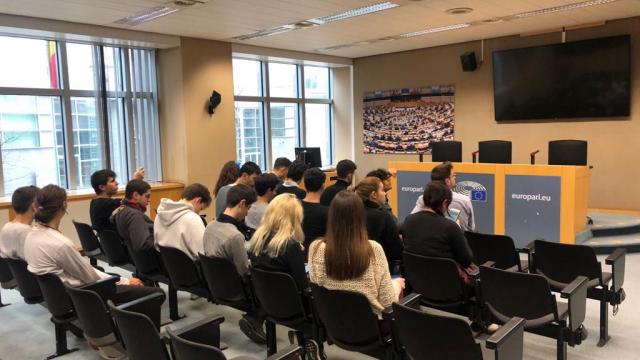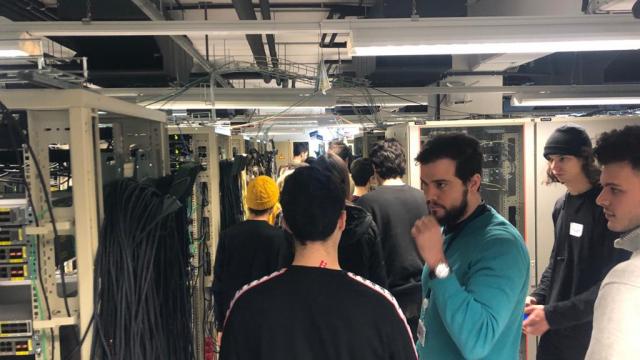Eurotrip: Our Student's diary
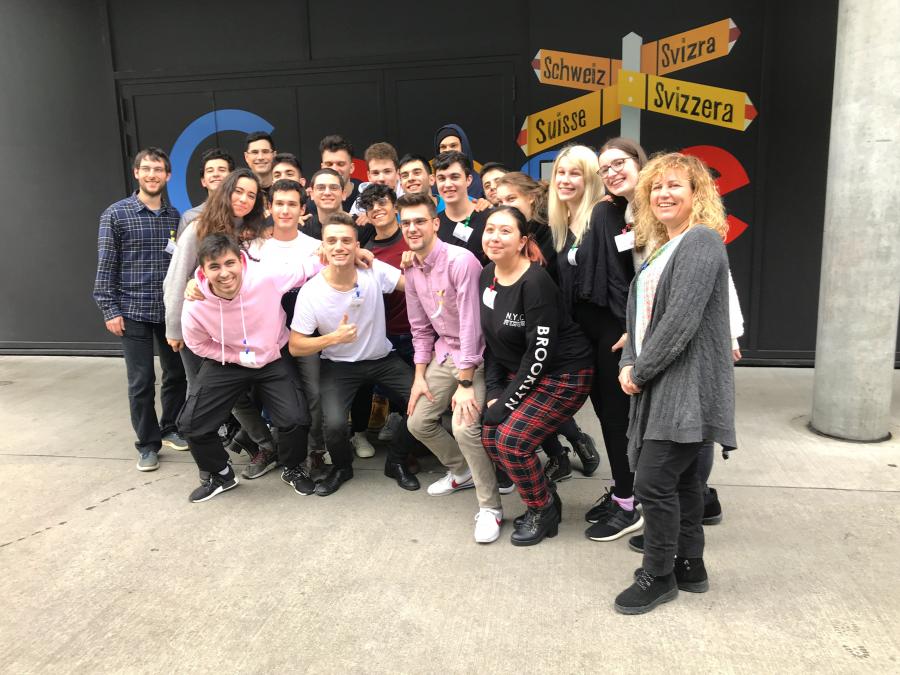
Our International Computer Engineering and Management of Business and Technology students were recently touring Europe, learning from the best companies and professionals.
This is their diary about what they saw, what they did and who they got to meet.
-
Day 01, by Gvozden Miskovic
We met at the airport at 5 am, two hours before our 7 am flight to Zürich. Flying with Vueling, we landed at the Swiss capital at around 9 in the morning. The much anticipated tour and presentation at Google’s Zürich campus was preficed with a healthy breakfast that kept us going until we were given the opportunity to buy lunch.
On site we were surprised to find Zooglers already busily bustling early in the morning, despite the company’s extremely flexible working hours. Our hosts presented to us their roles at the company and gave us insight into the company culture and what it is like to work for a tech industry leader. We were then given a brief tour of the working environment. Many were very impressed with the lengths the company had gone to so as to endure employee comfort at work, even including a slide in one of the main cafeterias. Unfortunately, however, the slide was not usable by visitors at the time. The visit concluded with a glance at the music room and arcade which among other things featured a digital mini golf field.
Once the formal visit was concluded we were taken to the central train station in Zürich from which we would later depart from to Frankfurt am Mein. Before this however we were given some two hours to explore the town at our own leisure. After this break, during which many ate lunch, we boarded the train to Frankfurt, a trip which took around 4 hours.
-
Day 02, by Adrian Falch Karlsen
The second day of the trip was spent firstly, and primarily, in Frankfurt, before the journey continued to Stuttgart.
The stay in Frankfurt began with an early guided trip around the city of Frankfurt, where we were guided to a few of more hidden beauties of Frankfurt. Later, after having lunch, the group moved on to the main event of the day, the European Central Bank (ECB). At ECB we got a small brief about which activities this cooperation conducts and what purpose it serves in relation to the European economy. Finally, our stay at ECB was rounded off with us getting the opportunity to spend some time with two of the Senior contributors of ECB’s Information Technology department. This revealed information about the different opportunities presented at ECB in relation to our degree as Computer Engineerers.
After our stay in Framkfurt we proceeded the trip, further backwards south, towards Stuttgart, where we finally concluded the activities of the day.
-
Day 03, by Adrian Falch Karlsen
The third day of the trip began with a visit to BW Con, a business accelerator and innovation network in the Stuttgart region. This was a great event with a well-balanced amount of business topics and technological topics. A panel of business owners and innovators presented to us the operations of the company and introduced us to the lifecycle of innovation. We were given a good opportunity to network with entrepreneurs in the tech industry, we were especially happy to communicate with the CEO of an augmented reality software development company. The opportunity to connect with these individuals has opened opportunities for expanding our current and future business careers. We were then taken, by these veterans of the industry, to the big innovators in the car industry, Porsche.
The leader of innovation at the German car manufacturer presented us the innovation cycle of the company and described to us the various sources of innovation that Porsche utilize. From the perspective of a business student it was extremely interesting to see that a company is planning their innovation over a 7 year period while also being flexible in accepting new innovation and immediately integrating it into products. It was also delightful to see that Porsche provides various data sources and APIs that developers can tap into to provide new services and products that Porsche is looking to integrate into their existing systems.
The day was concluded with a round visit of the Porsche Museums, located at Porsches facilities in Stuttgart. This visit was of a great interest to many of us, even though the experience was not directly linked to the tech-world. At the museum we were provided with both physical car models and their preparatory background history.
Finally, the journey took on to Brussels in Belgium, where we travelled by train.
-
Day 04, by Adrian Falch Karlsen & Gvozden Miskovic
The fourth day of the trip was spent exploring Brussels and vising the house of the democratically elected parliament of the European Union. We began the day walking through the city towards the European Parliament. It was intriguing to see the cultural differences in terms of the acceptance of an overactive bladder. Specifically, the town is littered with various statues, monuments and graffiti depicting human urination. The city also features various styles of architecture including late gothic, medieval, early 20th century as well as many buildings designed with a more contemporary modern style such as the European Parliament building.
Upon completing our short tour of the city, we made our way to the European Parliament where a civil servant engaged with us in a discussion about the internal functioning of the European Union, its history and the direction it is heading in the future. This discussion was particularly interesting with respect to the electoral voting system for electing Members of the European Parliament (MEPs). More specifically it was interesting to hear about the wide range of voting systems including, mixed member proportional representation, instant-runoff (alternative) voting as well as the various ways the different member states bind, or do not bind, their MEPs to particular constituencies within the member state.
After this discussion we headed to the hemicycle which house the EU Parliament’s debates in Brussels. Here we were lucky to witness the final debate attended by United Kingdom MEPs who would, as of the following day, no longer be part of the European Parliament when the UK officially exited the union. We also witnessed part of the ongoing debate about the standardization of device charging technology within the EU. We were privy to the strong arguments in favour of mandating a single charging technology within the EU posed by MEPs from Croatia.
